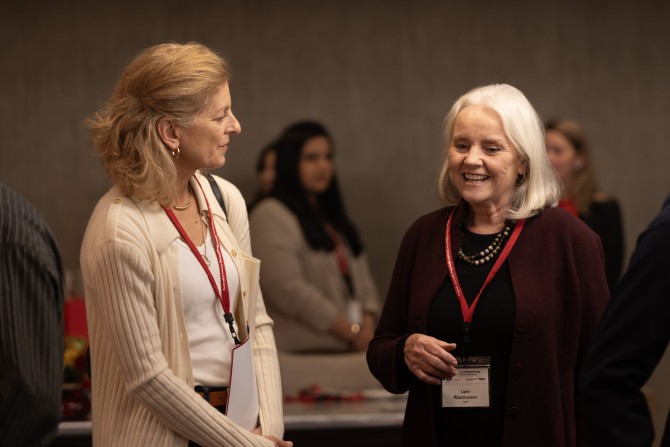
Jeff Loren ’75 speaks with Oliver Gao, director of Systems Engineering at Cornell (left), and David Schneider, director of the Systems Engineering M.Eng. program (right), at the Cornell Systems Summit.
News directly from Cornell's colleges and centers
Inaugural Cornell Systems Summit brings global experts to campus
By Diane Tessaglia-Hymes
Systems engineering experts worldwide from academia, industry and government gathered Nov. 3-5 at Cornell to present research and exchange insights on approaches to global systems challenges as part of the first annual Cornell Systems Summit.
Hosted by the Cornell Systems Engineering program, the theme of the inaugural summit was “Transdisciplinary Frontiers in Systems Engineering Innovation.”
Cliff Whitcomb, co-organizer of the summit and professor of practice in Systems Engineering, was among the opening speakers and described the summit as a success.
“We provided a forum for dialogue on systems for the future workplace, education and systems sciences that attendees found compelling,” said Whitcomb, a retired naval officer with more than 35 years of experience in defense systems engineering and related fields. “Our speakers were authors, leaders, faculty and researchers in many areas related to systems. What emerged was a fulfilling enrichment of perspectives across systems topics.”
The Nov. 4 morning presentation by Lynn Rasmussen, a 25-year member of the International Society for the Systems Sciences and author of "Seeing: A Field Guide to the Patterns and Processes of Nature, Culture, and Consciousness," focused on explaining the basics of systems science and how to teach it, offering a final summary that “systems science offers a fundamental understanding of how systems work, and how they go wrong.”
Linda Booth Sweeney, systems educator, writer, and faculty member for The Obama Foundation, presented the Nov. 5 keynote “It’s complicated! Overcoming Obstacles to Thinking In Systems.” Her interactive session explored the challenges of ‘thinking in systems,’ highlighting common misperceptions and barriers to systems thinking and sharing practical strategies for overcoming obstacles to support ongoing systems education and solutions to complex challenges.
Other lectures focused on the three themes of the summit: energy, health care and artificial intelligence. Semida Silveira, professor of practice in Systems Engineering, discussed the impacts of the greatest energy challenges facing society: the world’s growing energy needs and threats and disruptions caused by climate change.
“In the early days, we talked about mitigation – reducing emissions that cause climate change,” said Silveira, a member of the Council of Engineers for the Energy Transition, organized by the United Nations secretary general. “Now we talk about adaptation. What are the transformative actions that we can take to improve energy efficiency and manage the impact of climate change?” added Silveira, who also stressed the importance of understanding what young people think and helping them see that opportunities for systems engineering work can occur in many energy fields.
Keith Hentel, executive vice chairman of radiology and vice president of Weill Cornell Imaging at Weill Cornell Medicine/New York-Presbyterian Hospital, described his talk as a “20-minute plea for help,” explaining how systems thinking is critical to solving paperwork, computerization and supply chains, and can help break down silos that exist in the health care field.
Zoe Szajnfarber, professor of engineering management, systems engineering, and of international affairs at George Washington University, talked about the role for systems engineers in AI, and the importance of systems engineering to ensure safe, robust and trustworthy AI systems.
The summit included breakout sessions, where participants assembled into smaller groups to engage with panelists and each other, finding ways to collaborate, touching on how to integrate systems engineering into school curricula and the workforce, exploring the levels of systems science that exist in humans and society, and discussing training and certification for systems engineers.
Other invited speakers included Lynden Archer, the Joseph Silbert Dean of Engineering at Cornell; Patrick Hoverstadt, a systems consultant and author of “Fractal Organization” and “The Grammar of Systems”; Sheri Marlin, author of the “Habit-forming Guide to Becoming a Systems Thinker”; Gary Smith, senior expert systems engineer at Airbus Defence and Space and president of the International Society for the Systems Sciences; and Jon Wade, professor of practice at the Jacobs School of Engineering at the University of California, San Diego.
Media Contact
Get Cornell news delivered right to your inbox.
Subscribe

